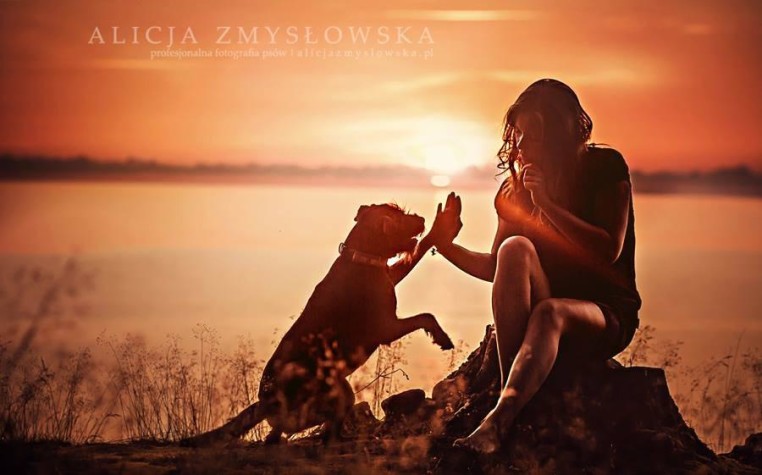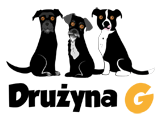
If someone asked me one and a half years ago; how I would like to raise my next dog, I would answered right away, YES, it is going to be an obedience dog. Oh boy, I was wrong. If you ask me now, my answer will be totally different. A year ago I started a trainer course (I will tell you which one when I graduate, but it is not in Poland) which has turned my beliefs, views completely upside down. When you add to this cooperation with one of the American trainers, you will see my head is almost exploding with knowledge. If I could adopt a new dog right now (I can not because G Team is too young and too crazy) I would not, besides of the above mentioned I would not adopt a new dog because I have no idea how I want to raise him. My ideas and view are undergoing massive changes. It is an amazing state of mind when each morning you wake up brainstorming new ideas. Every day I think about what I have just learned and how I can use it in my work with dogs. Step by step I am creating my own methodology and techniques. It is a lifetime process. Thanks to a solid foundations which I am creating right now, I will soon know what I want.
I changed dramatically my system of work with dogs. I have made so many mistakes while working with G Team, some of which rebounded upon our relationships. Slowly I am forming a basics rules for working with each of my dogs.
How am I working with my dogs now and what is the most important for me? I will try to sum up what I value most when working with dogs:
1. First and foremost. Trust and communication.
I can not work with a dog that does not trust me and does not understand me. As a matter of first priority, it means that we will not move forward without it. It is impossible to work with a dog we do not understand. Because we do not know when he is afraid of something, when something is too difficult for him or too stressful. It is the same the other way around. If there is an error in a dog-human communication then my dog will not know when I am proud of him, or when I am happy of our work together.

2. Errors are just information not a reason to be frustrated.
“All men make mistakes, but only wise men learn from their mistakes.”- Winston Churchill.
When during a working session with a dog an error appears it is a feedback. It helps me to plan my work for the future, adjust it to my leaner. To many errors, mistakes are a sign that something is wrong with our training. Maybe a method we have chosen is not appropriate for our learner. Errors are inseparable part of the learning process. But if you send your dog to a square for a fifth time around and on your cue, he repeatedly starts to bark and looks around, it means you are doing something wrong. Maybe it is a good time to get back to the basics or maybe you missed some point in the process. An error is just an information and it is does not have to be negative.
„It is about living life with such strength and emotion and knowing that waves are just part of the ocean.”
3. Engagement.
There is no work without engagement. With Gapcio I have come a long way from being a dog who did not know how to work, through a dog whose tiny motivation I have almost destroyed by placing intense pressure on him, to a dog that loves working with me. You can not force engagement. I believe that, if my dog does not want to work with me, he does not have to. I want my dogs to have such motivation for working with me that they will ask for it and initiate it. I want my dog to cherish every moment we spend together. It is a process that requires a lot of patients and love to what you do. If someone judges a dog only by his utility and competition scores he will not have a relationship based on mutual engagement.
There was a time when I was working with Gapcio in a way that almost destroyed the remaining of his motivation (it was not based on aversive techniques, it simply lacked fun, engagement and choice, the only thing that was left was pressure) and this period has given me a great lesson for the rest of my life; I know how I will never work with any dog ever again.
4. It is all about fun! Play.
I mean personal play not with toys or treat. Not on cue that means it is time for play. I took me a while to learn how to play with my dogs. Just like that, without any traditional reinforcement. When you have only yourself to offer. When we finally made our way through mistakes in communication, insecurity we were able to discover what is really fun for us. Then our relationship and work that follows has moved to a different level. There is no training without playtime. When I look at us playing together I can see we are both having a good time.

5. Adjusting work to the dog’s life stages.
I have to admit I am recently a little bit petrified while watching videos of puppies. I do not see puppies on them, because a puppy is a kid and it is supposed to act like one. Two and a half month puppy doing distance control exercises and staying in place for almost a minute…. I really do not like it. I belief that this period of life should be used for absolutely different experiences in a puppy’s life. Adjusted to his physical BUT also emotional stages. I know you can teach a puppy to and go around the cone from 30 meters distance. But why would you do that. For me it is much more important to build a solid relationship with a puppy, encourage him to explore the world, be curious and engaged in our work together. There will be a time for teaching him particular exercises. Now I want him to trust me in every situation, I want him to like spending time with me, to choose me over distractions. But not because he was told to do so but because he wants to and because I am the most important person for him. I want him to be able to communicate with me , to play with me, because if this is done any exercise is just a matter of time.
6. You have a choice.
Not every dog has to be an obedience or agility master. Even if you take a dog from a sport kennel he may not like what you have chosen for him and you have to get over it.
I could not imagine forcing Gacek to do obedience. He does not like it, it does not go with his character, he has much more fun doing agility. So despite the fact that obedience I one of my favorite activities, I do it with him very rarely and on his rules. Dog has to have a choice. He is not a machine at our every beck and call. He can have a headache or not be in the mood even when we are on our most important competition.
Ask yourself a question; does your dog have fun with what and how you are doing together? Would you like to work with a person like yourself? The answer has to be sincere. Because the only persons you will be cheating is yourself and your dog. If it is only you who is having fun, maybe it is time for a change?

7. It’s not how fast you can do it, it’s how slow you can do it correctly” Tom Martinez.
Dog training is not a time race. I do not want to hurry up with Gapcio and pass through all obedience classes just to get to the highest one. I think it is more then just that when you work with dogs. Each and every moment, stage of work is priceless for me. I love to focus on details and polish them. I do not see the reason why I should hurry up. In Poland, it is not a big deal to get to the highest class of obedience and you can do it quite fast. But doing it correctly is a different story. Some things can not be skipped. If you lack basic skills, it will finally get you that you are not able to move forward and it will cause frustration. That is why when I am starting to teach my dog certain exercises I want to do this precisely from the beginning to an end. It often means slowly.
My work with Gacek taught me that I have to be careful when moving to a next level of learning process. I have to be sure he understands what I want to teach him and that learning is a pleasure for him.
It ts the same with Gunia, I do not want to rush with her in mantrailing, making each time more difficult then the other.
Faster does not always mean better
8. Ethics.
The basic one for work. I will not hit my dog or use any form or physical force, I will not push my dog to a situation he may not handle, I will not force my dog to do things he does not wan to.
Besides , there are things I will not teach my dog. Because every behavior we teach has a consequence.
There is a long way ahead of me and I am really looking forward to it. We learn through our whole life and the only thing that comes to my mind now is „I know that I know nothing”- Socrates.

